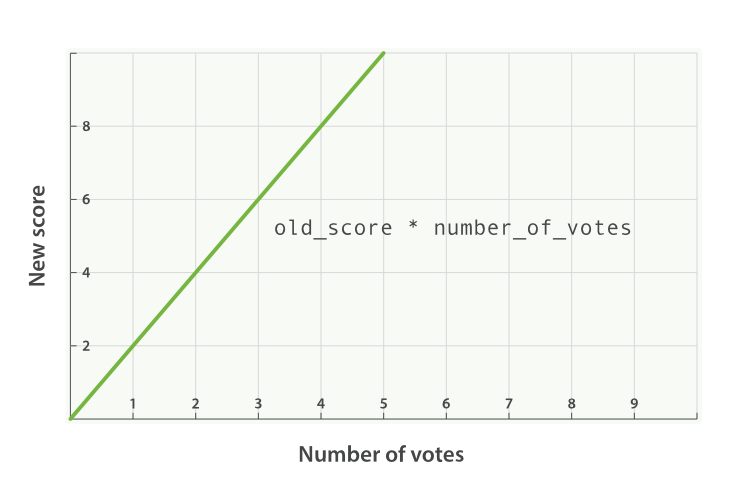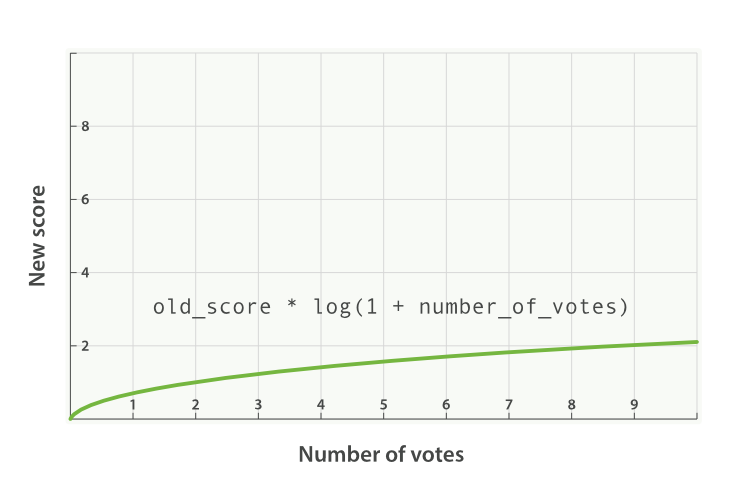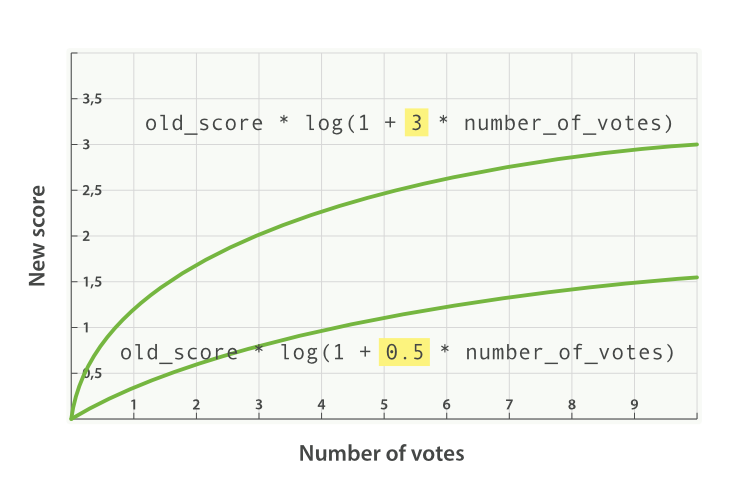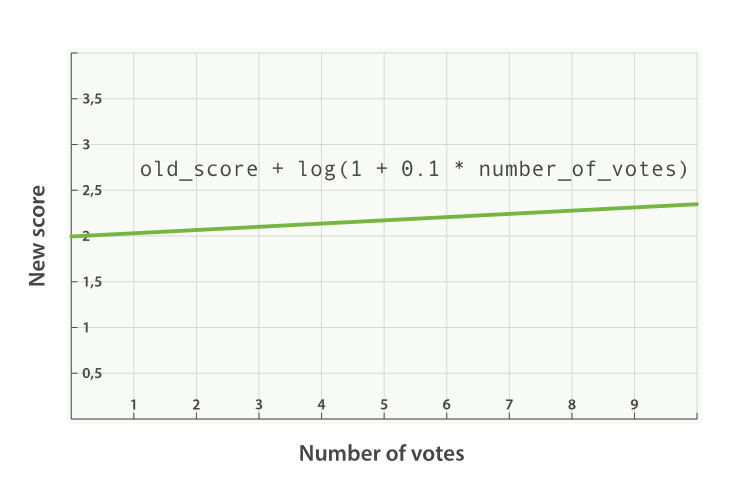We are working on updating this book for the latest version. Some content might be out of date.
Imagine that we have a website that hosts blog posts and enables users to vote for the blog posts that they like. We would like more-popular posts to appear higher in the results list, but still have the full-text score as the main relevance driver. We can do this easily by storing the number of votes with each blog post:
PUT /blogposts/post/1
{
"title": "About popularity",
"content": "In this post we will talk about...",
"votes": 6
}At search time, we can use the function_score query
with the
field_value_factor function to combine the number of votes with the full-text relevance score:
GET /blogposts/post/_search
{
"query": {
"function_score": {  "query": {
"query": {  "multi_match": {
"query": "popularity",
"fields": [ "title", "content" ]
}
},
"field_value_factor": {
"multi_match": {
"query": "popularity",
"fields": [ "title", "content" ]
}
},
"field_value_factor": {  "field": "votes"
"field": "votes"  }
}
}
}
}
}
}
}
The | |
The main query is executed first. | |
The | |
Every document must have a number in the |
In the preceding example, the final _score for each document has been altered as
follows:
new_score = old_score * number_of_votes
This will not give us great results. The full-text _score range
usually falls somewhere between 0 and 10. As can be seen in Figure 29, “Linear popularity based on an original _score of 2.0”, a blog post with 10 votes will
completely swamp the effect of the full-text score, and a blog post with 0
votes will reset the score to zero.
A better way to incorporate popularity is to smooth out the votes value
with some modifier.
In other words, we want the first few votes to count a
lot, but for each subsequent vote to count less. The difference between 0
votes and 1 vote should be much bigger than the difference between 10 votes
and 11 votes.
A typical modifier for this use case is log1p, which changes the formula
to the following:
new_score = old_score * log(1 + number_of_votes)
The log function smooths out the effect of the votes field to provide a
curve like the one in Figure 30, “Logarithmic popularity based on an original _score of 2.0”.
The request with the modifier parameter looks like the following:
GET /blogposts/post/_search
{
"query": {
"function_score": {
"query": {
"multi_match": {
"query": "popularity",
"fields": [ "title", "content" ]
}
},
"field_value_factor": {
"field": "votes",
"modifier": "log1p"  }
}
}
}
}
}
}
}The available modifiers are none (the default), log, log1p, log2p,
ln, ln1p, ln2p, square, sqrt, and reciprocal. You can read more
about them in the
field_value_factor documentation.
The strength of the popularity effect can be increased or decreased by
multiplying the value
in the votes field by some number, called the
factor:
GET /blogposts/post/_search
{
"query": {
"function_score": {
"query": {
"multi_match": {
"query": "popularity",
"fields": [ "title", "content" ]
}
},
"field_value_factor": {
"field": "votes",
"modifier": "log1p",
"factor": 2  }
}
}
}
}
}
}
}Adding in a factor changes the formula to this:
new_score = old_score * log(1 + factor * number_of_votes)
A factor greater than 1 increases the effect, and a factor less than 1
decreases the effect, as shown in Figure 31, “Logarithmic popularity with different factors”.
Perhaps multiplying the full-text score by the result of the
field_value_factor function
still has too large an effect. We can control
how the result of a function is combined with the _score from the query by
using the boost_mode parameter, which accepts the following values:
-
multiply -
Multiply the
_scorewith the function result (default) -
sum -
Add the function result to the
_score -
min -
The lower of the
_scoreand the function result -
max -
The higher of the
_scoreand the function result -
replace -
Replace the
_scorewith the function result
If, instead of multiplying, we add the function result to the _score, we can
achieve a much smaller effect, especially if we use a low factor:
GET /blogposts/post/_search
{
"query": {
"function_score": {
"query": {
"multi_match": {
"query": "popularity",
"fields": [ "title", "content" ]
}
},
"field_value_factor": {
"field": "votes",
"modifier": "log1p",
"factor": 0.1
},
"boost_mode": "sum"  }
}
}
}
}
}The formula for the preceding request now looks like this (see Figure 32, “Combining popularity with sum”):
new_score = old_score + log(1 + 0.1 * number_of_votes)
Finally, we can cap the maximum effect
that the function can have by using the
max_boost parameter:
GET /blogposts/post/_search
{
"query": {
"function_score": {
"query": {
"multi_match": {
"query": "popularity",
"fields": [ "title", "content" ]
}
},
"field_value_factor": {
"field": "votes",
"modifier": "log1p",
"factor": 0.1
},
"boost_mode": "sum",
"max_boost": 1.5  }
}
}
}
}
}The max_boost applies a limit to the result of the function only, not
to the final _score.



